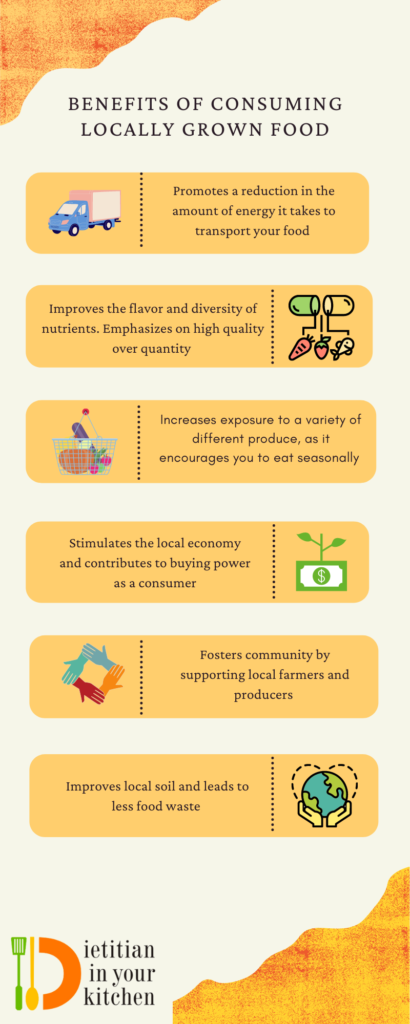Are You Eating Locally Grown?
October 29, 2021
For the month of October, we celebrated National Farm to School Month by crunching into locally grown apples! National Farm to School Month focuses on teaching kids about where their food comes from. Ultimately understanding where food comes from, can impact food purchasing habits which leads to increased intake of locally grown produce.
Consuming locally grown food by local farms helps to reduce greenhouse gas emissions, food waste, and promote healthy soil!
Eat Seasonally
Aside from sustainable practices, enjoying locally grown food compels you to eat seasonally. By eating seasonally, you can enjoy a variety of produce which increases the diversity of nutrients in your diet. As all produce has different nutrients—such as vitamins, minerals, and antioxidants—you are helping your body get everything it needs for maintaining health and promoting growth!
What about cost?
Often locally grown food is comparable in cost to what you find at a local store (sometimes you will find local at the store). When you buy local, that money goes directly to the farmer. That farmer then utilizes that money on their employees, local merchants or other expenses. This contributes to the local economy and adds further investment in the community’s future. So buy local when you can!

Locally Grown in Columbus
Here at Dietitian In Your Kitchen, we celebrated Farm to School Month by providing a cooking demonstration at South Side Family Farms, one of our community partners. Our cooking demonstration tied together celebrating National Farm to School Month and The Great Apple Crunch—where we prepared a Cabbage Cranberry Apple Slaw for those that attended. The recipe utilized locally grown Ohio apples, cabbage and dried cranberries. These ingredients are packed with vitamins, fiber, and water that help to nourish our bodies and support the local community. Each participant received a copy of the recipe, and a bag of seasonally fresh produce from the farm including all of the ingredients to make the slaw.
Why Consume Fruits & Vegetables?
Nutrition is where it’s at, consuming adequate amounts of fruits and vegetables daily allows us to support our bodies with critical nutrients such as vitamins B & C, potassium and fiber.
- B vitamins such as folate, play a crucial role in metabolism and help to maintain cell functions.
- Vitamin C acts as an antioxidant in our system, helping to neutralize free radicals and supports the immune system.
- Potassium acts as an electrolyte in our body and helps to coordinate muscle contraction and supports the nervous system.
- Fiber plays a significant role in maintaining digestive health and helps to remove cholesterol from the body.
Now that you know the benefits of consuming produce, check out my demonstration of the Cabbage, Cranberry, Apple Slaw recipe for the ladies at CURVES.
Supporting sustainable practices and the local economy is very important, however, supporting your body and your health comes first. So regardless of whether the fruits and vegetables are frozen, canned, commercial or local—it’s better to have some than none.
Mitch Coale, Dietetic Intern
If you want to learn more about the impacts of nutrition and ways to optimize your health through nutrition—schedule a discovery call with one of our dietitians!
Don’t forget to keep in touch on more strategies on ways to improving your health, by signing up for out newsletter!
Blog post written by Mitch Coale, Dietetic Intern, Master of Dietetics and Nutrition, The Ohio State University
Citations:
- ALEKSANDROWICZ L, GREEN R, JOY EJ, SMITH P, HAINES A. THE IMPACTS OF DIETARY CHANGE ON GREENHOUSE GAS EMISSIONS, LAND USE, WATER USE, AND HEALTH: A SYSTEMATIC REVIEW. PLOS ONE. 2016;11(11):E0165797. PUBLISHED 2016 NOV 3. DOI:10.1371/JOURNAL.PONE.0165797
Subscribe to our newsletter
Get seasonal recipes, new trends in food and fitness, and dietitian jokes. There’s no spam, and you can unsubscribe at any time.
